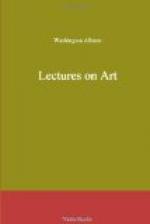We shall now ascend from the probable to the possible, to that branch of Invention whose proper office is from the known but fragmentary to realize the unknown; in other words, to embody the possible, having its sphere of action in the world of Ideas. To this class, therefore, may properly be assigned the term Ideal.
And here, as being its most important scene, it will be necessary to take a more particular view of the verifying principle, the agent, so to speak, that gives reality to the inward, when outwardly manifested.
Now, whether we call this Human or Poetic Truth, or inward life, it matters not; we know by its effects, (as we have already said, and we now repeat,) that some such principle does exist, and that it acts upon us, and in a way analogous to the operation of that which we call truth and life in the world about us. And that the cause of this analogy is a real affinity between the two powers seems to us confirmed, not only positively by this acknowledged fact, but also negatively by the absence of the effect above mentioned in all those productions of the mind which we pronounce unnatural. It is therefore in effect, or quoad ourselves, both truth and life, addressed, if we may use the expression, to that inscrutable instinct of the imagination which conducts us to the knowledge of all invisible realities.
A distinct apprehension of the reality and of the office of this important principle, we cannot but think, will enable us to ascertain with some degree of precision, at least so far as relates to art, the true limits of the Possible,—the sphere, as premised, of Ideal Invention.
As to what some have called our creative powers, we take it for granted that no correct thinker has ever applied such expressions literally. Strictly speaking, we can make nothing: we can only construct. But how vast a theatre is here laid open to the constructive powers of the finite creature; where the physical eye is permitted to travel for millions and millions of miles, while that of the mind may, swifter than light, follow out the journey, from star to star, till it falls back on itself with the humbling conviction that the measureless journey is then but begun! It is needless to dwell on the immeasurable mass of materials which a world like this may supply to the Artist.
The very thought of its vastness darkens into wonder. Yet how much deeper the wonder, when the created mind looks into itself, and contemplates the power of impressing its thoughts on all things visible; nay, of giving the likeness of life to things inanimate; and, still more marvellous, by the mere combination of words or colors, of evolving into shape its own Idea, till some unknown form, having no type in the actual, is made to seem to us an organized being. When such is the result of any unknown combination, then it is that we achieve the Possible. And here the Realizing Principle may strictly be said to prove itself.




